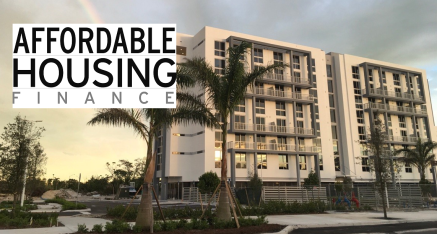Miami Project for Low-Income and Formerly Homeless Families Opens
Developers Carrfour Supportive Housing and Green Mills Group deliver 88 units of needed housing.
By Christine Serlin
Florida developers Carrfour Supportive Housing and Green Mills Group have completed an 88-unit development to serve low-income and formerly homeless families, including veterans, in Miami’s Goulds neighborhood.
Karis Village is an eight-story building that includes 74 units for households earning at or below 60% of the area median income (AMI)—about $31,700 a year—and 14 units at or below 33% of the AMI—about $17,500 a year. Approximately half of the units are set aside for at-risk veterans transitioning from the streets.
“Karis Village provides a safe, permanent home as well as a full complement of supportive services for some of our community’s most vulnerable residents, including veterans and their families,” said Stephanie Berman, president and CEO of Carrfour.
The development features a mix of studio, one-bedroom, and two-bedroom units. The Trinity Empowerment Consortium, a local agency that provides homebuyer and financing literacy and is affiliated with the Department of Housing and Urban Development (HUD), will occupy 3,000 square feet of ground-floor space for its Miami headquarters.
Amenities include a children’s playground, a library, a computer lab, a fitness center, and an outdoor barbecue and patio area. Certified by the Florida Green Building Coalition, Karis Village also features solar panels, low-VOC paint, low-flow bathroom fixtures, and Energy Star–certified appliances, ceiling fans, and light fixtures.
In addition, on-site supportive services are offered to help residents achieve independence, including literacy training, employment assistance, health and wellness services, and case management. Crossroads Management, a subsidiary of Carrfour, is the property manager.
The $30 million Karis Village was financed with low-income housing tax credits and a SAIL loan from the Florida Housing Finance Corp. Hudson Housing Capital served as the tax credit syndicator and an equity provider for the development, and Capital One was the construction lender. Additional funding for supportive services and rental assistance for the formerly homeless households was provided through the Miami-Dade County Homeless Trust’s HUD Continuum of Care and the Housing Authority of the City of Miami Beach’s project-based Veterans Affairs Supportive Housing (VASH) program, with services provided by the VA.
APR

